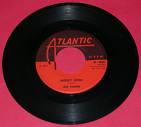Honey Hush
| "Honey Hush" | |
|---|---|
 |
|
| Single by Big Joe Turner | |
| B-side | "Tomorrow Night" |
| Released | August 1953 |
| Format | 10-inch 78 rpm & 7-inch 45 rpm |
| Genre | Blues, rhythm and blues |
| Length | 2:25 |
| Label | Atlantic |
| Writer(s) | Lou Willie Turner |
"Honey Hush", written by Big Joe Turner (although he assigned the copyright to his wife, Lou Willie Turner), was recorded in May 1953 in New Orleans, Louisiana, and released that August by Atlantic Records. It was a number-one song on Billboard's Rhythm and Blues chart for eight weeks.
Turner, a big Kansas City blues shouter, had been spending all his time out on the road, while Atlantic's Ahmet Ertegün was getting nervous that his backlog of Turner recordings was running low. When Turner was near New Orleans, Ertegün insisted he record. Atlantic's New Orleans recording studio was booked up, so Turner recorded some sides in the studio of a radio station, WSDU. He did not have his own band but was able to round up the raucous trombonist Pluma Davis and his band, the Rockers, as well as the wild boogie rhythm pianist, James Tolliver. Other musicians on the recording were Lee Allen on tenor saxophone and Alvin "Red" Tyler on baritone saxophone.
Like the session, the song is largely adlibbed traditional blues verses with various incongruous lines thrown in, to a standard 12-bar blues. It opens with the bold statement, "Aw let 'em roll like a big wheel in a Georgia cotton field, Honey hush!" The title in this song Turner revealed his typical attitude toward a woman who will not do what he tells her to do, while the tailgate trombone gives the woman's raucous answers back. Although his songs talk about relationships as misery, his emotion in the song is upbeat. To quote Arnold Shaw in his book Honkers and Shouters
"Love ain't nothin' but a lot of misery," he would declare, exhibiting no emotion in his characterization of the female as demanding, unprediciable, and untrustworthy. But unlike his predecessors in the blues, he did not cry or get uptight over it.
The spirit of the song is the good-natured optimism that characterized his work. His lyrics are sexually suggestive and aimed at an adult audience and his vocal style is that of an urban blues shouter – intimate and relaxed.
...
Wikipedia
